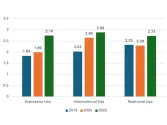Non-contributory plans propel market growth in group life insurance
Recent trends show a significant rise in employer-paid insurance policies driving market expansion.
The global group life insurance market has been projected to experience an annual growth rate of 10.7% until 2032, driven by the rising popularity and dominance of non-contributory plans in the workforce.
Yogendra Beesetty, a Senior Analyst specialising in Banking, Financial Services, and Insurance (BFSI) at Allied Market Research, said that the market share of non-contributory plans hold over 70% of the global interest.
"In recent years, the field of non-contributory plans is dominant in the market... It is valuable work that helps attract and retain qualified employees in the competitive job market," Beesetty noted.
He further elaborated on the benefits of such plans, highlighting their cost-effectiveness and tax advantages for employers and employees alike, as well as their ease of management compared to traditional retirement plans like the EPF and NPF.
The projected market growth is driven by a growing recognition among businesses of the critical link between financial stability for employees and overall productivity. "The market is growing due to the awareness of the significance of financial stability and employees," Beesetty stated.
He also pointed to the role of technological advancements and government initiatives in spurring this growth. Notable examples include the collaboration between Max Life Insurance Company and the Indian industrial association, which aims to extend life insurance access to the MSME sector's workforce in Uttar Pradesh, India.
Technological innovations, particularly the integration of artificial intelligence (AI) and advanced data analytics, are identified as key factors enhancing operational efficiency and customer engagement in the group life insurance sector.
Beesetty highlighted the transformative impact of AI and wearable technology in streamlining the underwriting process and providing personalised insurance plans. "The integration of artificial intelligence and advanced data analytics is streamlining the underwriting process," he explained.
Further examples of technological integration include the strategic partnership between FjH parent LP and IBM, which represents a $450 million investment aimed at transforming life insurance policy services through AI and automation tools. This move underscores a broader industry trend towards leveraging technology to improve customer experiences and operational efficiency.



















 Advertise
Advertise







